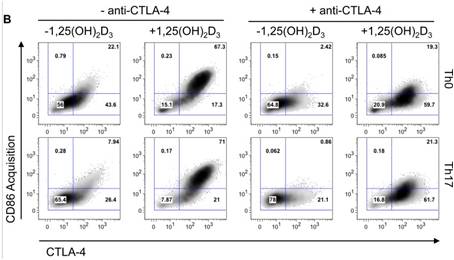Anti-CD86, clone BU63, was featured in a recent PLoS One paper authored by researchers based at the University of Birmingham and University College London. This paper, published only 3 weeks ago, shows the importance of vitamin D in inflammatory settings. The data revealed an inhibitory effect of Th17 polarising conditions upon CTLA-4 mediated regulation and that 1,25 dihydroxyvitamin D3 counteracts this effect. BU63 was used in FACS analysis in this publication but also has applications in immunohistochemistry, immunofluorescence, immunoprecipitation and Western blots.

Representative FACS plot of CD86-GFP acquisition versus trafficking CTLA-4. Image published in Jeffery et al. 2015. PLoS One. 10(7):e0131539.
CD86 is a transmembrane glycoprotein which belongs to the immunoglobulin superfamily. It is expressed on an array of antigen-presenting cells that provide co-stimulatory signals necessary for T cell activation and survival.
BU63 was developed in the early nineties by Professor Roy Jefferis whilst at the University of Birmingham. After obtaining a BSc and PhD in Chemistry, Jefferis has devoted his research career to the structure and function of antibodies in health and disease. A current focus of his research is the potential for immunogenicity of an allotype mismatch between an IgG therapeutic and a patient’s IgG haplotype.
View the datasheet for more information and publications.
HAVE YOU REGISTERED?
Join the ever-growing global Ximbio community. Register and receive updates about new reagents, institutes and new features being added to the website.
